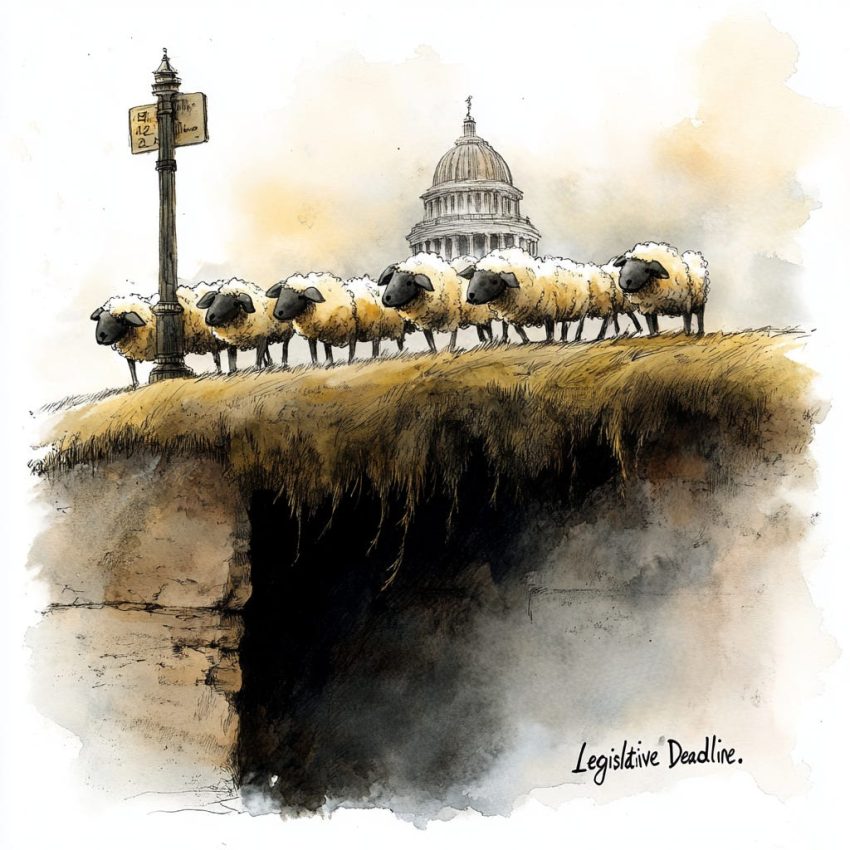 EDITOR’S NOTE: Here’s an installment from Tillamook County’s State Representative Cyrus Javadi’s Substack blog, “A Point of Personal Privilege” Oregon legislator and local dentist. Representing District 32, a focus on practical policies and community well-being. This space offers insights on state issues, reflections on leadership, and stories from the Oregon coast, fostering thoughtful dialogue. Posted on Substack, 3/26/25
EDITOR’S NOTE: Here’s an installment from Tillamook County’s State Representative Cyrus Javadi’s Substack blog, “A Point of Personal Privilege” Oregon legislator and local dentist. Representing District 32, a focus on practical policies and community well-being. This space offers insights on state issues, reflections on leadership, and stories from the Oregon coast, fostering thoughtful dialogue. Posted on Substack, 3/26/25
By Cyrus Javadi, State Representative District 32
You could almost hear the sighs in committee rooms across Oregon on March 21, as the work session posting deadline came and went—quietly, bureaucratically, fatally—dragging a whole pile of bills into legislative purgatory. For those who don’t speak fluent Salem-ese, this is the point where any bill that hasn’t already been scheduled for a work session becomes toast. Dead. Donezo. Unless you count procedural necromancy, these measures aren’t moving forward this session.
Now, this deadline isn’t meant to be some dramatic, do-or-die spectacle. Think of it less as a guillotine and more as a sieve. But it is meaningful. It’s the moment when lawmakers stop pretending they can juggle an endless parade of ideas and start narrowing down which proposals actually have legs.
And there’s no shortage of ideas. As of early March 2025, Oregon legislators introduced more than 3,000 bills, resolutions, and memorials—a huge increase over the total number of measures filed in the entire 2023 session. So yeah, we’re dealing with a legislative funnel that’s getting a little crowded at the top.
A Stampede of Bills, A Narrow Trail Ahead
Plenty of proposals didn’t make the cut. Some were perennial long shots. Others had merit but either never found enough support or a legislator willing to navigate them through the committees. And there are always a few that simply fade away for reasons no one will ever write down—call it “creative differences” if you want. That’s the nature of deadlines: they narrow the field and let us focus on ideas that might actually make it to the floor.
So what’s next? Enter April 9th, the first chamber deadline. By that day, any bill still sitting in committee needs to be voted out if it wants a crack at a full floor vote. Between now and then, things speed up, amendments pile on, and the House and Senate floors start to resemble a legislative speed-dating event—Who’s got the best pitch? Who can muster enough votes? Who’s about to get friend-zoned for lack of political spark?
The Ones Still Grazing
I have a few dogs in this fight—I’ll mention a few here (and the rest after the next deadline). There’s House Bill 3326, which plugs a glaring hole by allowing low-income seniors on Medicaid to receive emergency dental care in an actual dental office—a benefit that, bizarrely, doesn’t currently exist in Oregon. Meanwhile, House Bill 3556 would let local governments use part of their transient lodging tax (TLT) for infrastructure and public safety. After all, if you’re collecting taxes from tourism, maybe some of that should help pay for the extra strain tourists place on roads and first responders. House Bill 3103 demands more transparency from the Oregon Department of Forestry about the Habitat Conservation Plan. Rural communities deserve to see the fine print—especially when it could reshape their economies and environments for decades. And House Bill 3942 ensures rural areas can keep critical care clinics like dialysis centers up and running; losing one clinic in a remote spot can be a matter of life or death.
On top of all that, Senate Bill 951 makes sure that when you walk into a medical office, your doctor—rather than some corporate CFO—is the one making decisions about your care. It reaffirms the idea from 1947 that medicine should be about patient health, not profit margins, and closes loopholes that let corporate interests call the shots.
Those Left at the Fence Line
Not everything survived, of course. House Bill 3559, which would have made it harder for kids to access tobacco products, missed the deadline. So did House Bill 3251, aimed at expanding coastal cell phone coverage—an issue that’s all too real for anyone who’s tried to make a phone call while driving Oregon’s scenic Highway 101.
Predators on the Perimeter
Some high-profile measures are still in play and raising eyebrows. House Bill 3827 would eliminate gillnet fishing on the main stem of the Columbia River—a proposal that’s rattling folks in historic coastal industries. House Bill 2548 proposes creating a new Agriculture Labor Board, which could mean higher costs and more bureaucracy for farmers who are already juggling labor shortages and rising expenses. And let’s not forget the perennial lightning rods—gun control, homelessness, and road funding. They’re all still floating around, waiting to see if they’ll pass muster before the April 9th clock runs out.
Cull, Don’t Kill
And yes, many proposals will fail. But that’s not necessarily bad. Some ideas aren’t ready for prime time. Others need more data or more buy-in—or maybe they just need to be introduced by someone with a bigger political megaphone. One thing is certain: if a concept has legs, it tends to come back around. Good ideas rarely stay buried.
They’ll Be Back Next Season
So if your favorite measure went nowhere this session, don’t despair. The legislature can feel like Hollywood: the sequel is never far behind. Legislators rework and rebrand ideas all the time, hoping the next session might offer a friendlier audience or a more receptive political climate.
For now, let’s acknowledge that March 21 wasn’t the end of the line—just the first big fence. Bills that cleared it are still in the race, barreling toward April 9th and beyond. And for those that didn’t? There’s always next season.


